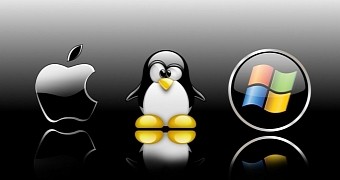In the last year or so, I've noticed that rolling-release distributions are becoming more and more popular among Linux users, and even big names like Ubuntu are considering the switch to a rolling update development model, but I think all operating systems should use the rolling release model.
In layman's terms, a rolling release model (often known as a rolling update development model) means that the respective operating system is continually being updated, and it doesn't have a version number. People who use a rolling release operating system, often say, "I use Arch Linux" or "I use Gentoo."
If we look at Wikipedia's definition of a rolling-release development model, we notice that there are many types of rolling release distributions, including part-rolling, full-rolling, pseudo-rolling, true-rolling, opt-rolling, and even cyclic-rolling, each one with its advantages and disadvantages.
Many of you will say that all OSes receive updates, daily or weekly. It's true, but most of them get major releases every six months or yearly, which include new technologies and software. For example, Ubuntu and Fedora release a major version every six months, Microsoft releases a new Windows version every few years, and this type of development model is called fixed-release.
A fixed release model is bad for both users and developers
A fixed release model means that the user will have to go through a sometimes annoying upgrade process or even download a new ISO image or buy a DVD disc with the latest version of the respective operating system, and then spend several hours reinstalling packages or tweaking their installations, which results in lack of interest in upgrading to a new version.
Every time a new release of an operating system comes out, there are numerous users on the Internet asking what's so special about this version and if it is worth upgrading, and that's a fact. Let's take a look at Ubuntu Linux for example, which with each new release it brings less and less innovative features. Only a recent kernel version, some refreshed wallpapers, and various updated software packages that could have been pushed to users through the main software channels.
Most media websites don't even bother reviewing recent versions of Ubuntu, simply because of their lack of new features. As such, I think fixed-release distributions are becoming boring to the end user. Because of this, Canonical, the company behind the world's most popular free operating system, is already considering switching to a rolling-release development model in the near future.
From a developer's point of view, a rolling-release model will decrease the development and maintenance workload when compared to a fixed-release development model. Not to mention that they will be able to offer their users all the latest technologies as soon as these become available on the market.
Version numbers become dead when a rolling release model is adopted
In the Linux world, rolling-release distros have been around for many years, but not many of you knew very much about them, mainly because some are still publishing a refreshed installation media (a.k.a. ISO image) on a monthly base, for example, the well-known Arch Linux operating system.
The fact of the matter is that a rolling-release development model will kill version numbers instantly when it is a adopted by an operating system, but that's not necessary a bad thing. I bet many of you are already tired of counting the version numbers of Ubuntu or Fedora. Now, I don't see myself saying in a few years, I run Ubuntu 19.10 or Fedora 45.
For those of you who are not in the loop, Microsoft unveiled recently the fact that the next major release of its famous computer operating system, Windows 10, will also be the last version of Windows, as they will offer a rolling release model to its users, called Windows As A Service. Basically, starting with Windows 10, Microsoft will drop version numbers, so you will simply say, "I run Windows" when asked what version of Windows you use.
On the other hand, Apple was always different than others. Its operating system for Macintosh computers is called OS X for more than 14 years now, but it still has version numbers, despite the fact that users receive these new releases every few months through the built-in App Store software updater. In the end, Apple might get tired of tagging new OS X releases with numbers, and it will make no difference to the end user.
Do we still need ISO images?
The answer will be yes, no doubt about it, simply because from time to time we do have to install an operating system on a new machine for a customer or a friend. And the only way to do that is to download a recent installation media of the respective operating system, write it on a USB stick or DVD disc and use it to install the respective OS.
I think that monthly ISO releases for Linux distributions are a good thing, and it doesn't involve too much development effort. Arch Linux is a very good example of distribution offering a monthly ISO image to users who want to deploy the operating system on new computers or reinstall the whole OS, and all distributions should adopt this model.

 14 DAY TRIAL //
14 DAY TRIAL //